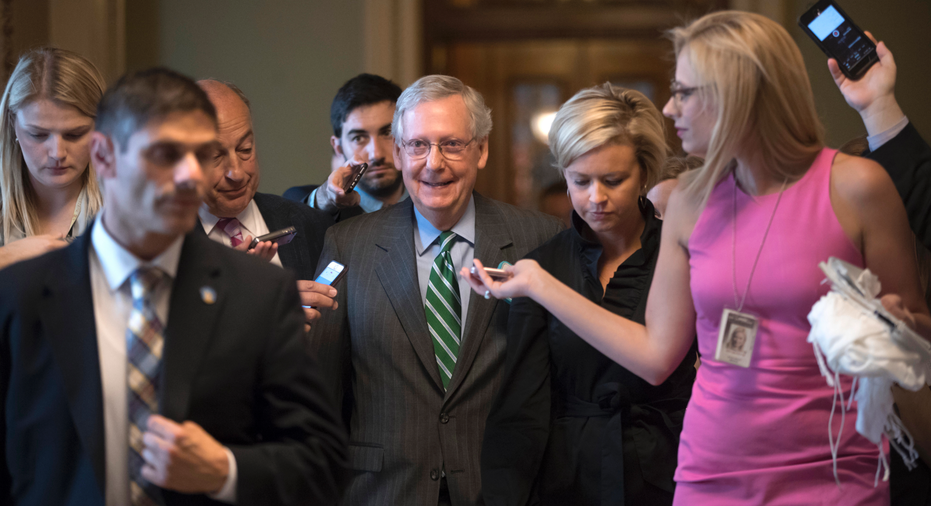Senate GOP health bill: Tax cuts for rich

WASHINGTON – Senate Republicans' new health bill cuts taxes by nearly $1 trillion over the next decade, mostly for corporations and the richest families in America.
It uses a budget gimmick to comply with Senate rules against adding to the federal government's long-term debt.
Senate Republican leaders unveiled a draft of their bill to repeal and replace President Barack Obama's health care law on Thursday and argued it would eliminate job-killing taxes enacted under the 7-year-old health law. Democrats countered that the bill is a giveaway to the rich at the expense of middle- and low-income families who will lose health insurance.
And in a Facebook post, Obama said: "The Senate bill, unveiled today, is not a health care bill. It's a massive transfer of wealth from middle-class and poor families to the richest people in America. It hands enormous tax cuts to the rich and to the drug and insurance industries, paid for by cutting health care for everybody else."
Senate Republicans released only a draft of their bill, with no analysis and no cost estimates. However, the tax cuts are very similar to those in the House bill passed last month, though some would be delayed to pay for more generous benefits.
The major tax provisions in the bill would:
—Delay a new "Cadillac" tax on high-cost health insurance plans until 2026. This is a budget gimmick to ensure that the bill complies with Senate rules that forbid the legislation from adding to the federal government's long-term debt.
The tax was part of Obama's health law, and it has long been unpopular among Republicans, as well as business groups and labor. On paper, the tax would take effect in 2026, generating billions of dollars in revenue every year after.
However, Congress has already delayed the tax once, until 2020, making it unlikely lawmakers will ever let it take effect. Of course, in 2026, it will be somebody else's problem.
— Repeal a tax on wealthy investors, saving them about $172 billion over the next decade.
Obama's health law enacted an additional 3.8 percent tax on investment income for married couples making more than $250,000 a year and individuals making more than $125,000. The Senate bill would repeal the tax this year.
About 90 percent of the benefit from repealing the tax would go to the top 1 percent of earners, who make $700,000 or more, according to the nonpartisan Tax Policy Center.
—Repeal a new Medicare payroll tax on high-income families, saving them about $59 billion over the next decade. Obama's health law enacted an additional 0.9 percent payroll tax on wages above $250,000 for married couples and above $125,000 for individuals. The Senate bill would repeal the tax in 2023.
—Repeal a tax penalty on larger employers not providing health insurance to workers, saving them $171 billion over the next decade.
—Repeal a tax penalty for people who do not get health insurance, saving them $38 billion over the next decade.
—Repeal a new annual fee on health providers, based on market share, saving them about $145 billion over the next decade.
—Repeal a 2.3 percent excise tax on companies that make or import medical devices, saving them around $19 billion over the next decade. The Senate bill would repeal the tax in 2018 — a year later than the House bill.
—Repeal a 10 percent excise tax on tanning services, saving people $621 million over the next decade.
___
Follow Stephen Ohlemacher on Twitter at: http://twitter.com/stephenatap



















